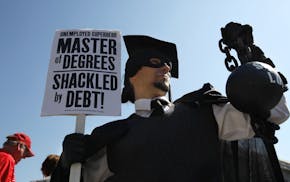Federal Reserve Chairman Ben Bernanke offered no new clues Thursday about what steps the central bank might take to boost the U.S. economy, but he did use the occasion to send Washington a message:
We can't do it alone, and right now you're not helping.
You won't find those precise words in the speech Bernanke delivered in downtown Minneapolis on Thursday (www.startribune.com/a658). Central bankers are cautious about how they say what they say because their words can generate big swings in the stock market. That's why a Bernanke appearance like the one in the Twin Cities includes a caravan of journalists to transmit his words around the world.
Not that those words are always so clearly understood. After all, Bernanke is an economist, a profession that treats plainspoken English as all but a second language.
Here's an example from Bernanke's speech about the value of government spending: "There is ample room for debate about the appropriate size and role for the government in the longer term, but -- in the absence of adequate demand from the private sector -- a substantial fiscal consolidation in the shorter term could add to the headwinds facing economic growth and hiring."
Translation: Hey, private employers aren't building new factories or hiring new workers, so this is the wrong time for federal and state governments to cut spending and eliminate jobs.
And how did Bernanke square this position with his oft-stated belief on the need for the United States to address projected long-term deficits? He cautioned lawmakers not to "disregard the fragility of the economic recovery" when making decisions about spending.
Translation: This is neither the time nor the place for austerity.
Bernanke hasn't officially come out in favor of another round of federal stimulus spending, but last month at Jackson Hole, Wyo., he noted, "Most of the economic policies that support robust economic growth in the long run are outside the province of the central bank."
In other words, the Federal Reserve can't create tax breaks for companies that hire new workers. It can't fund and operate an infrastructure jobs program. It has no say on the duration of unemployment benefits. Only Congress can address such things.
Meanwhile, as he's been doing for months, Bernanke indicated that the Fed is willing to do its part to help ensure that the U.S. economy does not slide back into recession.
Still, many observers believe the Fed is running out of ammunition. Interest rates already are near historic lows, but consumers and businesses are unable or unwilling to borrow. The Fed could eliminate the interest rate it pays banks on their excess reserves, but there's little evidence that will spur additional lending.
These may be effective tools, but they are like scalpels or other precise surgical instruments. They're not much help when you have to crack open the patient's chest in order to massage a heart that has stopped beating.
And at the moment, that's what the U.S. economy seems to need most.
ericw@startribune.com • 612-673-1736

Wieffering: Time to get over debit card fees
For Thrivent and others, warnings were there

With billions in sales, some co-ops are big business
